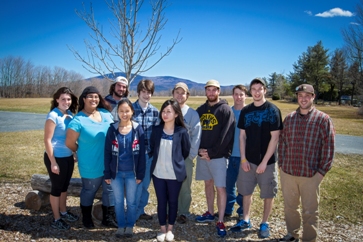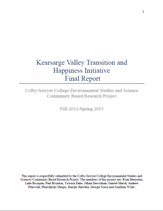
Kearsarge Valley Transition Town & Happiness Initiative
The 2012-2013 Community-Based Research Project team collaborated with community members, businesses, and local groups to implement the infrastructure of a Transition Town in the Kearsarge Valley region as defined by the towns of New London, Springfield, Sutton, Warner, Wilmot, Andover, Newbury, Bradford and Sunapee. A Transition Town Initiative seeks to develop localized solutions to larger global issues such as economic insecurities, environmental instabilities and our dependence on non-renewable energy. This is accomplished by creating a network of local individuals, families, businesses and organizations that are committed to improving the well-being and resilience of our neighborhoods and communities now and into the future. We also created templates for a local Resiliency Survey and an Energy Descent Action Plan (EDAP). In April 2013 the Kearsarge Valley Transition Initiative was recognized by the internationally-based Transition Network and Transition U.S. as the 139th “official” transition initiative in the United States joining approximately 460 other official initiatives worldwide and over 1,100 more in the process of forming.
In addition to that project we also disseminated a Happiness Survey created by the Personality and Well-Being Laboratory at San Francisco State University in partnership with the Happiness Initiative in Seattle, Washington. The survey was distributed to students, faculty and staff at Colby-Sawyer College and was also made available to residents in the Kearsarge Valley area. The Happiness Survey we used was adapted from a more complex data-gathering instrument used in the country of Bhutan to measure Gross National Happiness as an alternative or complementary measure to Gross Domestic Product. The Seattle-based survey we used assesses well-being by measuring responses across several domains: overall satisfaction with life, material well-being, environmental quality, governance, community vitality, cultural vitality, education and learning, physical health, time balance, psychological well-being and workplace experience. We analyzed the data from participants and included recommendations in our final report that can be built upon by next year's Community-Based Research Project team and utilized by college staff to develop responsive, solutions-based programming.
We are very thankful for the cooperation of the Colby-Sawyer community and all of the local residents, business and organizations that supported our efforts. We'd like to especially thank our Task Force members: Tom Bates, Leigh Bears, Susan Chase, Larry Chase, Dale Reynolds, Diane Rosewood, Jimmy Sferes, Elisabeth Shedd, John Taylor, Nancy Teach, Joanna White and Candis Whitney.
We are also grateful for the guidance and leadership of our professors Harvey Pine and Jennifer White, as well as the expertise and mentorship from our professional course consultants Tina Clarke (Certified Transition Trainer with Transition U.S.) and John de Graaf (Director of Take Back Your Time, author of Affluenza and What's the Economy for Anyway, and one of the co-founders of the Happiness Initiative.)
The members of this project are: Ryan Bernstein, Luke Boyajian, Paul Boynton, Victoria Dake, Jillian Dervishian, Garrett March, Andrew Pehoviak, Phurchhoki Sherpa, Jenisha Shrestha, George Sousa and Jonathan Wylie.



